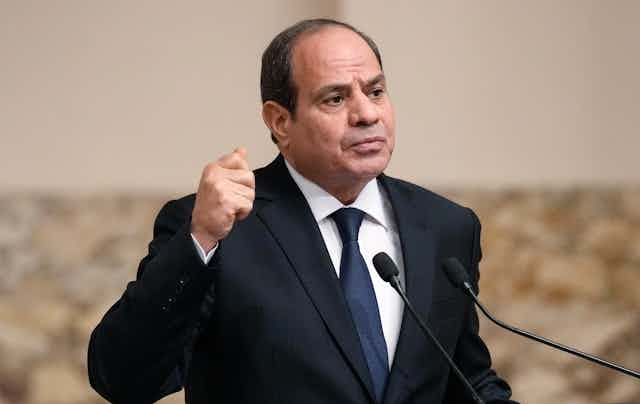The bitter conflict between Israel and Hamas could not have come at a worse time for Egypt. Abdel Fattah al-Sisi, the former military strongman who seized power in 2013 amid the turbulent fallout of the Arab Spring, faces a general election in December.
Beset by economic woes and with a political and humanitarian catastrophe unfolding on his country’s border, it will be an election fraught with risks.
Sisi effectively took power in July 2013, after decades of military dictatorship under Hosni Mubarak. Mubarak’s 30-year reign, which ended in April 2011 during the Arab Spring, was followed by a brief and turbulent interregnum in which a Muslim Brotherhood-backed government led by academic Mohamed Morsi struggled to maintain order.
In July 2013, Sisi removed Morsi from power and won 96% of the vote the following year in an election which drew widespread international criticism. He has not really faced significant political opposition since, but this can’t hide his deep unpopularity with many Egyptians.
At present, Sisi presides over what most experts would say is a contender for the region’s worst performing economy. Annual inflation hit a historic high of 38% in September and the youth unemployment rate is currently running at 17%.
Compounding this economic crisis have been several rounds of currency devaluation and an incoming mandated International Monetary Fund bailout. A harsh IMF-imposed austerity programme will push struggling Egyptians to a level of destitution not seen since the Egyptian bread riots of 1977.
It’s against this unstable background that Sisi will have to fight for reelection. You could be excused for assuming it would be a mere box-ticking exercise, as Sisi has ruled Egypt with an iron fist since ousting the Muslim Brotherhood in July 2013’s brutal coup.
No election has been free and fair since then and Egypt’s independent media has been all but crushed in the interceding years. Opposition parties have either been suppressed or co-opted, while civil society – previously a lively political sphere – now looks back at Mubarak’s dictatorship with a degree of nostalgia.
Initially – and for the first time since Sisi took power – it looked as if he would face a credible opposition. Former MP Ahmed Tantawi, a candidate for the Civil Democratic Movement, made a name for himself as an MP by openly criticising Sisi in parliament and not taking part in the National Dialogue.
This was a Sisi-sponsored initiative which was launched in May 2023. It was presented by the government as an inclusive forum for addressing Egypt’s economic and political challenges – but has been dismissed by critics as merely a vehicle for Sisi’s own agenda.
Tantawi’s campaign gained momentum with support from prominent left-wingers, secularists and even some Muslim Brotherhood leaders in exile, attracted by Tantawi’s stance on releasing political prisoners. There are currently an estimated 40,000 political prisoners in Egypt’s jails, many of them Muslim Brotherhood members.
But Tantawi withdrew his candidacy on October 13, saying that pro-government “thugs” were preventing people from registering their support for his candidacy.
If his abortive campaign wasn’t a direct threat to Sisi, Tantawi’s popularity represents a structural shift in Egyptian politics. Sisi has dealt so badly with Egypt’s economic problems in recent years it has left him vulnerable.
And his habit of incautious statements hasn’t helped – at one point when questioned about the soaring price of okra, an Egyptian staple, he suggested they emulate the followers of the prophet Muhammad and “eat leaves”.
War on the doorstep
With the war in Gaza on Sisi’s doorstep, the regime faces a difficult balancing act. Israel is bent on securing its border no matter the consequences for Egypt. Yet the fallout for Sisi at home could antagonise domestic vulnerabilities. The image of thousands of Gazans dying while Egypt’s Rafah border stays closed could be very harmful for the regime.

Sisi needs to be cautious, given his close relationship with the Israeli government. Egypt has been party to the 16-year-long Israeli blockade of Gaza, enforcing tight controls on the border crossing at Rafah.
But with an election looming he now needs to appease an Egyptian public who are far more sympathetic to the Gazan’s plight than the Israelis. He has attracted widespread criticism from opponents who say his administration has been organising staged protests to piggyback on public sympathy for Palestinians as the death toll from Israel’s war on the Gaza Strip rises.
But the real risk to his administration lies at home with the ever-present threat of Egypt’s well-established Islamist movements. It was a Muslim Brotherhood-sponsored popular uprising at Tahrir Square that toppled Mubarak and handed government to Morsi and the Muslim Brotherhood in 2011.
That history now acts as a serious warning for Egypt’s military to never be complacent about the potential threat of Islamist movements. Sisi’s regime has done its utmost to destroy the Brotherhood.
In the ten years since his security forces massacred more than 900 people while violently breaking up mass anti-government sit-ins in Rabaa al-Adawiya and al-Nahda squares in August 2013, tens of thousands have been subject to arbitrary detention without trial or have been sentenced in military courts to lengthy prison terms for dissent.
Perhaps the most shameful exhibition of corrupt use of power was his regime’s treatment of Morsi. The former president died after collapsing inside the defendants “cage” in a Cairo courtroom following six years in solitary confinement.
It is one thing for an incumbent to deal with the failings of a collapsing economy. It is quite another to accommodate an aggrieved public watching a human rights massacre right on its border. If the Sisi regime continues to let this happen on its watch, the opposition will have more ammunition than they have had for years.

